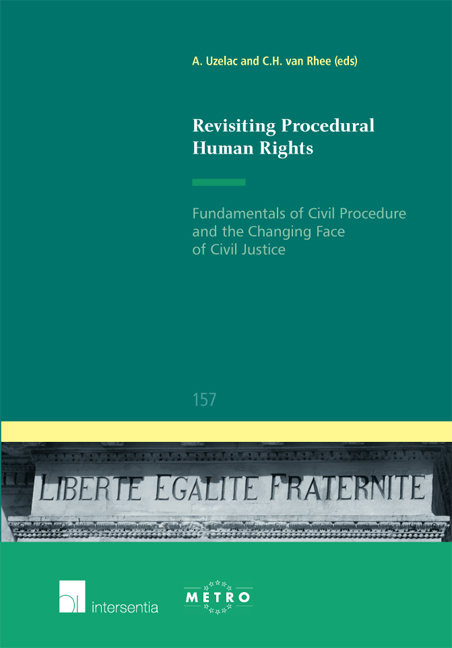 Revisiting Procedural Human Rights
Revisiting Procedural Human Rights from Fundamental Procedural Rights from a National Angle
Published online by Cambridge University Press: 13 October 2018
Introduction
Russia has been working continually to improve the functioning of its judicial system and the administration of justice for more than twenty years. Today we are seeing a new level of judicial reform that is a topical subject much discussed among the members of the Russian legal community: specifically, the judicial reform of commercial litigation – ‘arbitrazh’ –, which underwent crucial changes in 2013- 2014.
It all started in June 2013 when President Vladimir Putin proposed a reorganization of the Higher Commercial Court of the Russian Federation during the St. Petersburg International Economic Forum. Just a few months later, in October the president introduced a bill to the state Duma (the lower house of the Russian Parliament or Federal Assembly) according to which the Higher Commercial Court would cease to exist and its jurisdictional powers pass to the Supreme Court of the Russian Federation, thereby turning it into a sort of super Supreme Court.
Some lawyers spoke out vigorously against the reform, describing it as confusing, pointless and, generally speaking, dangerous. Others said that arguments opposing the reform went beyond criticism and were merely falsehoods intended to block judicial reform efforts. The debate continues today.
The Court System Issue
The new judicial reform debuted with Bill No. 352924-6 sent by the president to the state Duma for consideration and aimed at ensuring the uniformity of the Russian court system and legal practice. The official title of the bill, which proposed amending the Constitution of the Russian Federation, was ‘On the Supreme Court of the Russian Federation and the Prosecutor's Office of the Russian Federation’. However, this title did not reflect the essential part of the bill that in reality entailed the abolishment of the country's Higher Commercial Court.
The Constitution Amendment Act on the Supreme Court of the Russian Federation and the Prosecutor's Office of the Russian Federation (the Constitution Amendment Act) was passed by the state Duma on 22 November 2013 and just a few days later by the Federation Council (i.e. the upper house) on 27 November. In February 2014, after the amendments had been approved by the legislative bodies of at least two-thirds of the federal subjects (constituent entities) of the Russian Federation, the law was enacted.
To save this book to your Kindle, first ensure [email protected] is added to your Approved Personal Document E-mail List under your Personal Document Settings on the Manage Your Content and Devices page of your Amazon account. Then enter the ‘name’ part of your Kindle email address below. Find out more about saving to your Kindle.
Note you can select to save to either the @free.kindle.com or @kindle.com variations. ‘@free.kindle.com’ emails are free but can only be saved to your device when it is connected to wi-fi. ‘@kindle.com’ emails can be delivered even when you are not connected to wi-fi, but note that service fees apply.
Find out more about the Kindle Personal Document Service.
To save content items to your account, please confirm that you agree to abide by our usage policies. If this is the first time you use this feature, you will be asked to authorise Cambridge Core to connect with your account. Find out more about saving content to Dropbox.
To save content items to your account, please confirm that you agree to abide by our usage policies. If this is the first time you use this feature, you will be asked to authorise Cambridge Core to connect with your account. Find out more about saving content to Google Drive.